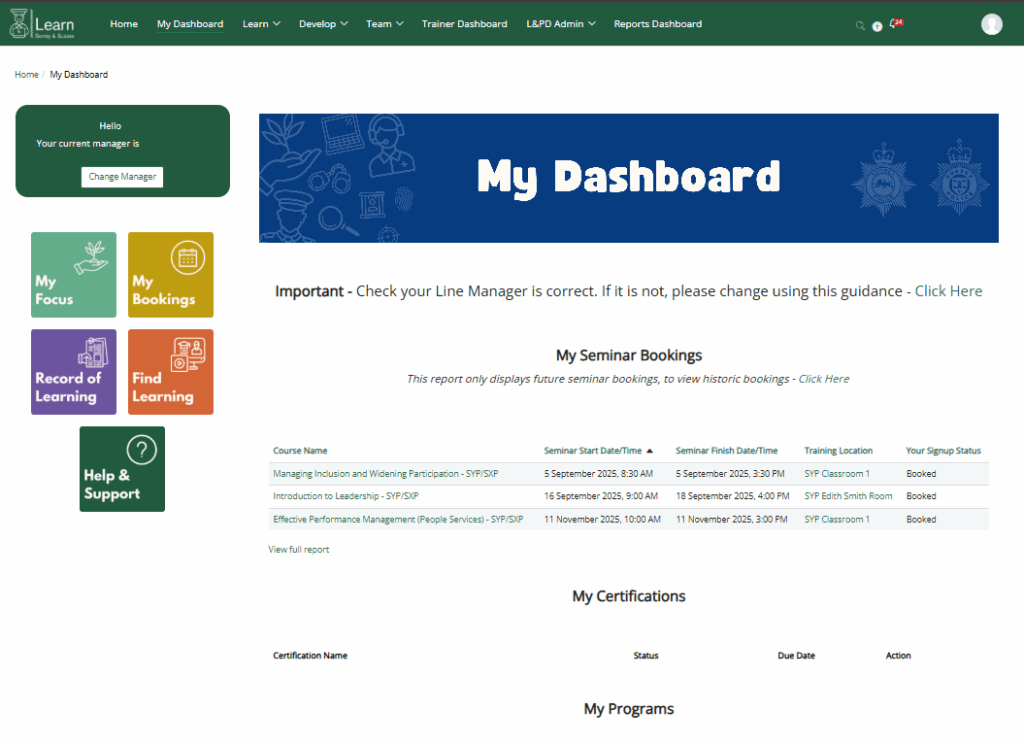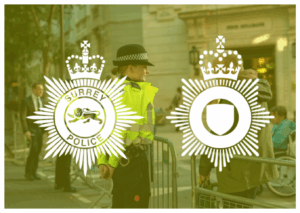Surrey and Sussex Police are two neighbouring police forces in the South East of England, responsible for maintaining law and order across their respective counties. While they remain separate entities, the two forces collaborate on several key operational and administrative functions, including learning and development, to enhance efficiency and resource sharing.
Policing a diverse geographical area—including urban centres, rural communities, major transport hubs, and coastal regions—requires a flexible and well-trained workforce. Officers and staff must be prepared to handle a wide range of incidents, from routine policing duties to complex criminal investigations and major public events.
With approximately 11,000 officers and staff, Surrey and Sussex Police provide critical services such as frontline response policing, specialist crime investigation, counter-terrorism operations, public protection, and emergency call handling. Given the breadth of these responsibilities, the forces have a diverse learning population, encompassing frontline officers, control room call takers, specialist investigative teams, leadership personnel, and administrative staff. Each group has distinct training needs, ranging from mandatory operational skills development to specialist courses tailored to their roles.
Overview
Surrey and Sussex Police have embarked on a significant transformation of their learning and development (L&D) processes to enhance training efficiency, streamline administrative tasks, and provide a more effective training experience for officers and staff. By implementing Totara, they are transitioning from manual and disparate training systems to a unified, automated, and data-driven learning environment. This case study explores how Totara, in collaboration with Think Learning, has empowered Surrey and Sussex Police to innovate, save time, and improve learning outcomes across the forces.
Challenges
Before adopting Totara, Surrey and Sussex Police faced several challenges:
-
Disparate Systems: Training was managed through separate systems, resulting in inconsistencies and inefficiencies. These systems lacked integration, meaning officers and staff had to navigate multiple platforms, causing confusion and duplication of effort.
-
Manual Administrative Burden: The training process was heavily reliant on spreadsheets, emails, and calendar invites, making it time-consuming and prone to errors. Administrative teams were burdened with tasks such as manually enrolling officers onto courses, tracking attendance, and sending training materials via email. This inefficiency reduced the time available for strategic learning and development initiatives.
-
Limited Tracking and Reporting: Without a centralised learning management system, monitoring course completions and compliance was a challenge. Training records were fragmented, making it difficult to track which officers had completed required courses, particularly those mandated by the College of Policing. This lack of visibility led to delays in reporting and potential compliance risks.
-
Complex Training Requirements: Police training is highly structured, with a mixture of theoretical and practical components. Officers must complete mandatory training on topics such as investigative procedures, public protection, leadership, advanced driving, and officer safety. Many of these courses involve face-to-face elements, scenario-based learning, and assessments, adding an extra layer of complexity to digital transformation.
-
In-Person Training Demands: Due to the nature of police work, much of the training requires in-person, hands-on sessions. Courses such as officer safety training, handcuffing techniques, first aid, and physical intervention cannot be effectively delivered online. However, tracking and managing these face-to-face training elements alongside online learning was difficult without a unified system.
-
Need for a Blended Learning Approach: The police training model includes a combination of classroom-based learning, practical training, and online materials. Officers must engage in pre-read materials, attend seminars, complete assessments, and undertake practical exercises. Prior to Totara, there was no seamless way to track a blended learning path that integrated all these components, making it difficult to monitor individual progress and compliance.
-
Multi-Force Collaboration: Surrey and Sussex Police operate as two distinct forces but have several shared services, including training. Previously, each force had its own approach to training delivery, leading to inconsistencies in course availability, content, and administration. Standardising learning across both forces was a significant challenge that the team needed to address.
What Do They Need to Learn?
Police officers and staff must complete a wide variety of training courses, many of which are mandated by the College of Policing. Key training areas include:
-
Operational and Tactical Training: Courses on investigative techniques, public order management, emergency response, and suspect interviewing.
-
Specialist Skills Development: Training in counter-terrorism, cybercrime, domestic abuse investigations, and forensic procedures.
-
Officer Safety and Public Protection: Regularly updated training on self-defence, handcuffing techniques, first aid, and crisis intervention.
-
Driver Training: Advanced and pursuit driving training for officers who operate police vehicles.
-
Leadership and Professional Development: Courses for supervisors and senior officers to develop leadership and decision-making skills.
-
Legislation and Compliance Training: Regular updates on criminal law, human rights, and procedural justice to ensure officers remain compliant with evolving legal requirements.
Solution
 Working with Think Learning, Surrey and Sussex Police have implemented Totara in order to create a centralised training platform that streamlined processes, reduced administrative burden, and improved accessibility for all officers and staff.
Working with Think Learning, Surrey and Sussex Police have implemented Totara in order to create a centralised training platform that streamlined processes, reduced administrative burden, and improved accessibility for all officers and staff.
“The Chief Constable delivered sessions to senior leaders over the space of a year. In the old system, that would have taken roughly 10 minutes per attendee for the admin team to book those people on. We put it on Learn and made it automated. They had roughly 650-700 people attend, so 650 times 10 minutes… we ended up calculating about two or three weeks of admin work had been saved.”
— Ian Chiverton
Key Features Implemented:
-
Automated Course Enrolment & Self-Service Access: Officers can now self-enrol in courses, reducing the need for manual intervention by administrators.
-
Comprehensive Training Programme Management: Large-scale training programmes, such as the PCEP (Police Constable Entry Programme) and CDIP (Control Room Call Taker Training Programme), are now tracked and managed effectively.
-
Enhanced Compliance and Reporting: The ability to generate real-time reports has significantly improved training compliance and operational oversight.
-
Seamless Integration with Other Systems: A daily data feed ensures user information is up to date, with plans to introduce a two-way integration to track training completion and skill authorisations.
“Our data feed from our HR system to Learn is crucial. We work to maintain it and ensure accurate data is coming into Learn.”
– Ian Chiverton
Impact & Results
“We’ve delivered 2,250 seminars so far on the platform, with around 19,600 people attending. When you consider that all of those would have previously required manual tracking, the time saved on admin is immeasurable. It’s allowed us to make learning more self-service and streamlined.”
“It’s allowing L&D admin to add value. The streamlined booking processes free up time, enabling greater support to the training teams which in turn reduces the admin burden on the trainers.”
– Kirsty Denman
The adoption of Totara has led to substantial improvements in efficiency, data accuracy, and user experience:
-
Greater Accessibility & Engagement: Over 11,000 user accounts have been created, with 8,923 active users logging in to access training.
-
Automated Training Records & Compliance Tracking: Training data is now instantly accessible, enabling compliance with the College of Policing’s standards and simplifying audits.
“We get inspected by external bodies, and they were very impressed with how Totara Learn tracks training.”
– Ian Chiverton
“We can now tell departments exactly how many people have attended seminars, how many no-showed, how often trainers were booked out, and what rooms were used. It’s data that previously would have been difficult to corroborate as it would have been spread across multiple systems.”
– Ian Chiverton
-
Massive Reduction in Administrative Work: Previously manual tasks, such as sending course reminders and tracking completion, are now automated. For instance, the Chief Constable’s senior leadership training saved an estimated three weeks of administrative work through automation.
-
Increased Self-Service Capabilities: Officers can now manage their training schedules independently.
-
Consistent Training Across Both Forces: The implementation of Totara has unified training programmes across Surrey and Sussex, enabling cross-force training and a more standardised learning experience.
“Since adopting Learn, we have been able to give users access to their own training records. Our admin teams also have instant access to detailed training reports which we have been able to customise for each department’s requirements. Prior to Learn, both of these would have been accessible via a support request to the admin teams and would have taken time to produce.”
– Ian Chiverton
Future Plans
Looking ahead, Surrey and Sussex Police plan to further enhance their learning ecosystem by:
-
Expanding Totara to Cover All Training Needs: Currently, one-third of all training is on the platform, with plans to onboard key areas such as driver training and Officer entry routes.
-
Implementing Advanced Approval Workflows: Enhancing approval processes to include multi-stage signoffs for critical training programmes.
-
Strengthening Integration with Other Systems: Developing a two-way data exchange between Totara and other systems to enable seamless skill tracking and workforce planning.
Surrey and Sussex Police have successfully leveraged Totara to modernise and streamline their training programmes. The system has not only improved efficiency and compliance but has also paved the way for future innovation in police training. By embracing digital transformation, the forces have created a scalable, efficient, and user-friendly learning environment that supports both operational and strategic goals.
Their journey demonstrates how a well-implemented learning management system can drive significant operational improvements, ultimately ensuring that officers receive the high-quality training needed to serve their communities effectively.






